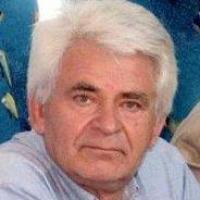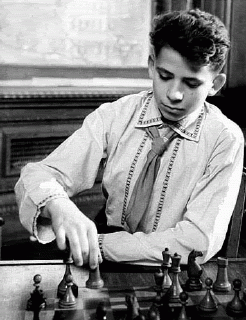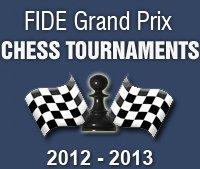
Boris Spassky at Hay-on-Wye
Gentleman Spassky charms Hay-on-Wye
Individuals who achieve greatness and fame in sports are normally remembered for their sublime skills and dramatic triumphs. It is Boris Spassky's tragedy to be forever remembered as the man who lost the World Chess Championship to Bobby Fischer. However, it is to Spassky's enormous credit that he not only doesn't mind this, but never seems to grow tired of speaking about his fateful and epic encounter with the eccentric American genius in 1972.
The "Match of the Century" against Fischer was once again high on the agenda during Spassky's appearance at the annual Hay Festival of Literature and the Arts in Wales, UK. Boris was interviewed by Ronan Bennett, an Irish journalist and novelist (his most recent novel "Zugzwang" is set in the world of chess), and accompanied by his French wife Marina.
After a warm reception from the audience, Spassky started by recalling his first chess game against his older brother, Georgi. The game ended quickly when, playing as Black, he was checkmated at f7 by the white Queen. "I cried" he said - but the loss made him want to get better - and get better he certainly did.
The young Boris was born in 1937 in the troubled city of Leningrad. Stalin's "Great Terror" was occurring and millions died as a result of the purges. The Spassky family survived, only to face the onslaught of the Nazis a few years later in the Second World War. Once again they survived - by escaping the siege of the city and fleeing to safety until Hitler had been defeated.
It was on his return to a devastated Leningrad that Boris Spassky fell in love with chess. His talent for the game quickly emerged and he was soon singled out for intensive tuition by the Soviet chess machine.
Spassky said that despite this assistance, he was not a part of the chess establishment, and certainly not wealthy in financial terms. "I was a beggar at that time, but at the chessboard I could make anything happen. I had great pleasure from chess."
In 1969 Spassky overcame the great Armenian champion Petrosian to achieve his ambition of becoming the World Chess Champion. However, Spassky noted that pictures of him winning the title show him looking very unhappy. "Being the champion is a heavy burden and responsibility. It changes your life. I was not prepared for it." 
When Spassky played Fischer in 1972 he was, of course, aware of the wider significance of the match with it's cold war overtones and publicity on a scale never before seen for a chess match. However, Spassky was never a communist and did not fight for the Soviet Sport Committee, but "for myself, my friends and helpers".
Spassky's approach to the game was very different from Fischer. Fischer famously said that he liked to "crush the ego" of his opponents. Spassky preferred to "fight on equal terms" with worthy adversaries.
Asked about the first game of the match, and Fischer's blunder 29...Bxh2, Spassky felt that this move was typical of Fischer's style. "He wanted to be active, to take risks", adding that he believed that computer analysis had now shown that the game might still be drawn after Fischer's "blunder".
After Fischer's no-show in game 2, the fate of the match hung in the balance. Fischer, upset by the TV cameras and the audience, wanted to play in a private room. Spassky generously agreed - against the wishes of the Soviet authorities - and the match was back on. Spassky, explaining that his name means "saviour" in Russian said, "I saved Fischer, but I committed suicide myself!"
Fischer's win in the third game of the match was the first time he had beaten Spassky. The spell was broken and Fischer was transformed into a confident and dangerous challenger. He never looked back, eventually winning by a convincing margin of 12.5 - 8.5. 
"I was happy to lose the championship", said Spassky, "My years as champion were the worst years of my life".
In 1976 Spassky emigrated to France where he still lives with his third wife Marina. At last Spassky found happiness in a country where he was "free like a bird to fly".
Spassky's rematch with Fischer in 1992, in defiance of international sanctions, was the last time the American played chess in public. Spassky was philosophical about the match, "It was great money and no responsibility".
These days Spassky has retired from chess, but still travels the world to chess events and teaches children to play. Asked about the influence of computers on the game, he felt that they had changed the game hugely, with opening databases making it more of a memory challenge. However, he was dismissive of chess960 (a.k.a FischerRandom Chess), "having the pieces lined up (differently) on the back row - it's not harmonious".
Asked about the nature of chess, Spassky struggled to answer, "it's enigmatic", he said with a shrug. He still enjoys playing friendly games with a glass of wine, and especially appreciates the beauty of chess compositions.
Spassky's chess heroes are all, by his own admission, tragic figures, "Morphy, Alekhine, Pillsbury, Tchigorin and Steinitz". "I am not an optimist" he said, to laughter from the audience.
Despite his loss to Fischer in 1972, Spassky always felt that he understood his adversary and following Fischer's arrest in Japan in 2004, Spassky appealed directly in a letter to President Bush on Fischer's behalf:
"In 1972, Bobby Fischer became a national hero. He smashed me in the match in Reykjavik. The Soviet chess hegemony collapsed. One man won against a whole army. I would not like to defend or justify Bobby Fischer, he is what he is. I am asking only for one thing. For mercy, charity. If for some reason it is impossible, I would like to ask you the following: Please correct the mistake of President Francois Mitterand in 1992. Bobby and myself committed the same crime. Put sanctions against me also. Arrest me. And put me in the same cell with Bobby Fischer. And give us a chess set."
The names Fischer and Spassky will forever be connected by their shared experience during that remarkable 1972 match that put chess on the map as never before and made headlines around the world. Spassky, now a venerable 71 years old, was clearly saddened when he spoke of Fischer's death, "He was an attentive and polite friend" he explained. They exchanged emails during Fischer's last years and as Spassky recalled the contents of one email he broke off into silence, lost in his own thoughts, visibly upset for a moment.
Spassky, the gentleman bon-viveur from Leningrad and Fischer, the eccentric loner from Brooklyn, NY, share a bond that will never be broken.
Spassky at Hay-on-Wye with his wife Marina:
